Jennifer Barclay's Blog, page 5
June 30, 2018
Up to Megalo Horio

In late June, I leave the lovely apartment by the sea. The local children have now finished school, tourists pass up and down and it’s even warm enough for the Syrian refugee ladies to wade into the sea in their flowing black dresses. The vegetable trucks drive up and down selling watermelons. It’s charming but not conducive to work. I knew from the start that the owner needed the apartment for the summer, and I need to be somewhere quiet to write.
On a hot day I clean the apartment from top to bottom and then carry the last of my things to the bus – the new island taxi suddenly nowhere to be found and the rental cars all rented out. It takes me three trips but I manage. The bus is mercifully almost empty on its way up, though I’m sure it will fill with people at Eristos. The driver stops outside the place I’ll stay for most of July, one of the large, shady studios opposite the shop in Megalo Horio, the old village on the hill.
I’ve also rented a space in the centre of the village by the church and the kafeneio. Panayiotis’ father had it as a pantopoleio, selling rice and beans and sugar and so on. After he died, Panayiotis and his brothers rented it as an office to the municipality, but recently the office moved and it became available. It’s exquisitely located but has no bathroom so I can only keep things in it; perfect for allowing me to live clutter-free for the summer.
Leaving my bags for now, I walk across the upper footpath to Agios Antonis for a swim at the little beach by the harbour. Returning, I listen to the cicadas grow louder in the trees around my balcony, until dusk turns to dark and they are replaced by scops owls. I fall asleep with a light breeze blowing through the window. And the next day in early afternoon, I walk to my favourite beach. I haven’t been there for months.
The valley is vivid green with thyme and oleander and other bushy plants. There’s a north wind blowing across the flat deep blue sea, making the Turkish cape perfectly clear ahead. After a first swim across the bay I lie on my towel on the coarse pink sand, heat seeping into my back muscles, my heels burning; when my body gets too warm, flies force me back into the cold sapphire sea. It’s peaceful, secluded, private: one couple hidden in the cove around the rocks, the occasional ship passing out to sea.
I walk back to the village and to my surprise and delight spot a single, almost-ripe yellow fig among the still-hard green ones, pick and eat it, a taste of wild summer.

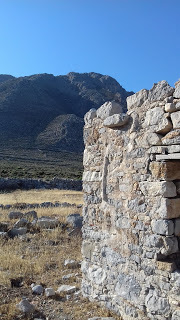
Published on June 30, 2018 22:56
March 17, 2018
A Dog from the Dodecanese (1)

So there I was, walking through Rhodes town, my left hand grasping my dog’s lead as she attempted to sniff every interesting urban aroma, while my right hand pulled a trolley on which was precariously balanced a giant dog crate, semi-secured in roughly improvised island style by a rope I usually used as her lead. It was late February, and although much of the month had been beautifully sunny, now the sky promised more rain. I’d spent over two hundred euros on this set-up and still had no idea, at this point, whether Lisa was going to get in the crate, or if it was exactly the right size, or how I was going to transport all of us to the airport when buses and taxis don’t allow dogs.Lisa is actually a golden retriever crossed with a hunting dog, or so the vet guesses. She became mine when she was two months old, five years ago. Born on Rhodes, she’s lived mostly on Tilos and for a while on Karpathos. We travel together regularly by ferry around the Dodecanese islands. The big ferries have upper-deck cubicles for dogs, generally with one or two unhappily barking occupants. Lisa likes to sniff around them before declaring she’d rather sit outside and get to know the other passengers. I almost always give in, which is why I usually travel with a big rucksack stuffed with fleece blankets and sleeping bag.
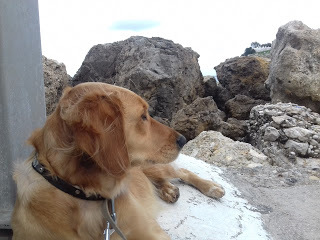
I’d never considered taking her to England. During my brief trips to the UK someone usually pet-sits her, and we’ve made new friends through pet-sitting sites. This time, however, I planned to stay in England for a couple of months. I’d been under the impression that it cost a huge amount to fly with a dog to the UK, but David emailed me a link to the relevant sectionof the Aegean Air website, stating that a dog accompanying its owner can travel for 150 euros or less. I was wary about the notion of putting my dog in the hold of a plane, but my friend Steven reasoned that it couldn’t be much worse than his commuter train. And at least she’d be happy when we arrived. Still unsure, I took Lisa to Rhodes to begin the procedure for a pet passport, which would need to be started at least a month before travel.Lisa allowed me to lift her onto the vet’s table for her microchip and rabies injection and only tried jumping off once. Hari the vet was very gentle with her and she responded to the offer of treats afterwards with happy tail-wagging. Hari told me the earliest date we could travel and said that if necessary he could drive us to the airport in his jeep when the time came. Before we left, I asked his young assistant to show me the IATA-approved dog crates. Since we’d have to fly from Rhodes, I’d pick up the crate a couple of days before travel. According to strict regulations, the crate (klouvi in Greek) must be 5–10 cm taller than the dog’s head when it’s standing normally, and the dog must have enough room to turn around and lie in a normal position. I tried to coax Lisa inside one of the larger models to check for size. She was a changed dog within seconds, resisting so vehemently with yelps and contortions and baring of teeth that I finally was forced to give up, afraid the vet’s assistant would think I was used to torturing my dog. I noted the crates’ dimensions and bought a tape measure, hoping it could be determined at home in relaxed conditions.
I decided to book a ‘Flexi’ flight to London in case of difficulties, and emailed Aegean Air to check some details. I received a helpful email back, detailing what I had already learned, plus one paragraph right at the end that said it would cost 890 euros for the dog. WHAT?It turned out that 'Transportation of dogs, cats and ferrets to the UK is only permitted for flights to London Heathrow and only to be sent as cargo,' charged according to weight. The friendly person at Aegean confirmed that flying to any other European destination with Aegean, there would be no such extra charge. Only the UK. I considered alternatives. If we went by trains, buses and ferries, we would save on airfares but might still have to buy the crate. I found a couple of useful sites online, such as The Man in Seat 61. Each section of the route, it seemed, would have its own guidelines and challenges, and Lisa could well be cooped up for much longer, in more difficult conditions. I remembered my experience in Crete when I was told that to travel by bus, she’d have to go in a crate among the suitcases in the unventilated space underneath… Other countries might have far worse regulations and I wouldn’t be able to communicate so well.Driving would make for a good adventure, but I don’t have a car and my driving experience is mostly limited to quiet roads and small towns. For a brief moment I considered doing an Ishbel ‘World Bike Girl’ and cycling it; but soon ruled that one out. However, it did give me the idea of asking Ishbel for advice, since we work together and she was at that moment fundraising to fly two rescue dogs from Brazil to the UK. She confirmed most people taking their dogs to the UK have to fly to France or Holland, then drive or take trains and ferries from there – though I should be careful as some ferries only allow pets inside a vehicle. Short of brute force, how would I get Lisa inside the crate? I asked Ishbel.'Chicken,' she replied. 'Chicken always works.'I emailed a couple of ferry companies and confirmed that the one ferry that would allow me to travel as a foot passenger with a dog was the Dieppe–Newhaven Transmanche. I’d been to Newhaven before so was comfortable arriving there. So I just needed to figure out the section from Paris to Dieppe.David lives in Paris but he travels to Greece often, and I sometimes travel to Paris. When I told him the new plan, he said – as I had hoped – he would meet me and Lisa at Charles de Gaulle airport and travel with us for fun to Dieppe.
It was time to make one more effort to measure Lisa. She was extremely suspicious of the tape measure and lay unhelpfully on her back with her legs in the air each time I went near her to determine her ‘natural standing position’ height. But finally, affection and treats prevailed, and I found that she wasn’t going to fit into the crates I’d looked at. It seemed absurd: she isn’t even a full-sized golden retriever. I called the vet’s office and spoke in Greek with one of the assistants, asking her to tell me the measurements of the biggest crate they had. There was a giant-looking one that I’d originally dismissed. The assistant was convinced that it was a metre high, which I was pretty sure couldn’t be true (maybe for a small giraffe rather than a dog), but I struggled to explain… I just had to hope it was the one I’d found online, and that it was a metre long. I’d keep my fingers crossed that it would be the correct fit.We took a few days' trip to Nisyros, research for something I'm writing. Back home, with all that needed to be done for the UK trip, I found I couldn’t focus on anything else. Thinking about it more was only making me anxious: packing, closing up the house, all the time not really knowing... But either it would work out or it wouldn’t. It was time to go for it, look upon the whole thing as an adventure and enjoy it.I decided to go out for a quiet dinner with friends at the kafeneio in Megalo Horio, then perhaps take the ferry the next morning and take things step by step. It was apokries, and the quiet dinner turned into dancing until 2 a.m… I made it to the ferry ticket office just moments before it closed, and suddenly we were off – on the first stage of our epic journey.
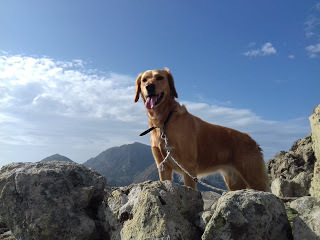
Published on March 17, 2018 06:33
December 10, 2017
Winter Holidays

‘Himoniatikes diakopes!’ – winter holidays – says Anna, one of the local ladies, as I pass her on the seafront. Half an hour ago I heard her shouting to a neighbour and realised she was in the sea.
‘I saw you swimming,’ I say.‘Yes, it’s beautiful… but I have to get dressed afterwards.’ She’s now bundled up in her winter clothes. I laugh knowingly. She asks after my family.It’s always good weather when I’m leaving Tilos for England in December. I’ve skipped one or two, but mostly I go away for a couple of weeks of work and seeing friends and family for the holidays, the yortes.
 At the start of December, there were days of warm, calm weather, and balmy nights when I would step outside my apartment in the dark to see the moonlight shimmering softly on the bay.In the early morning, I like the moment at 5.30 a.m. when the streetlight outside my bedroom window is switched off, leaving just the first of the daylight. On the 5th December it was so calm, I listened to the faint chugging of the fishing boat as the sky brightened. There was also a big cargo ship in the bay. When I threw on some clothes and took Lisa out, I heard the cry of ‘Psaria!’ – the dulcet tones of Nikos, captain of the Sofia, announcing fish for sale. Sure enough, his truck was in the square and the fishermen enjoying a coffee at Georgos’ kafeneio. I bought a bag of marides, the small fish that are in season right now, and sat down for a coffee and a chat with Stelios while waiting for Savvas to open the post office. Georgos, handing me my Greek coffee, tutted that my black leggings were covered in dog hairs. As I walked back home with my bag of fish, Panayiotis was sitting outside his mini-market and told me to wait while he filled a little bag with dried rosemary. ‘When you fry fish, put rosemary in for flavour.’
At the start of December, there were days of warm, calm weather, and balmy nights when I would step outside my apartment in the dark to see the moonlight shimmering softly on the bay.In the early morning, I like the moment at 5.30 a.m. when the streetlight outside my bedroom window is switched off, leaving just the first of the daylight. On the 5th December it was so calm, I listened to the faint chugging of the fishing boat as the sky brightened. There was also a big cargo ship in the bay. When I threw on some clothes and took Lisa out, I heard the cry of ‘Psaria!’ – the dulcet tones of Nikos, captain of the Sofia, announcing fish for sale. Sure enough, his truck was in the square and the fishermen enjoying a coffee at Georgos’ kafeneio. I bought a bag of marides, the small fish that are in season right now, and sat down for a coffee and a chat with Stelios while waiting for Savvas to open the post office. Georgos, handing me my Greek coffee, tutted that my black leggings were covered in dog hairs. As I walked back home with my bag of fish, Panayiotis was sitting outside his mini-market and told me to wait while he filled a little bag with dried rosemary. ‘When you fry fish, put rosemary in for flavour.’
 Then a freezing north wind held us in its grip for a couple of days. I had to close the wooden shutters as their metal hooks were clanking. The sea wind was howling and the waves crashing roughly on the pebbles, and there were whitecaps out beyond the bay, the horizon bumpy. Inland it might feel much warmer, but I love being so close to the sea, intensely aware of its mood. It was a good time to remember Saint Nikolaos, protector of fishermen, with his name day on 6th December.
Then a freezing north wind held us in its grip for a couple of days. I had to close the wooden shutters as their metal hooks were clanking. The sea wind was howling and the waves crashing roughly on the pebbles, and there were whitecaps out beyond the bay, the horizon bumpy. Inland it might feel much warmer, but I love being so close to the sea, intensely aware of its mood. It was a good time to remember Saint Nikolaos, protector of fishermen, with his name day on 6th December.
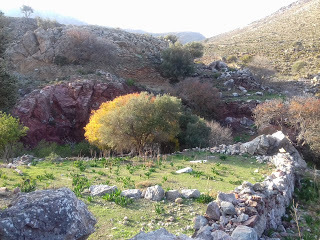
These winter days I’m busy with editing work, so a mid-morning break to buy food and treats is inevitable. Seeing the white van in the square means there will be olive oil, oranges, lemons, lettuce and spinach. And having got accustomed to making my own bread for the last few years, I’m now making the most of the bakery. Lately there have been calzouni, pastries with cheese and honey, and little syrup cakes made with tahini… All the more reason, then, to put on hiking boots and get some exercise in the early afternoon. Lisa shakes her hairs all over the place and jumps around excitedly, nose in my face as I try to lace up my boots. It might be a walk towards Lethra for a swim, or a hike up one of the tracks behind Livadia to the ridge above, the silent high places where people lived long ago in now-abandoned stone houses. The hillsides are turning green with fresh shoots; there are acorns underfoot and autumn leaves, crocus blooming and the leaves of cyclamen appearing – their flowers something to look forward to in the coming month. After the cold wind dropped, there were two sunny days with flat clear seas and I swam, enjoying the feel of the water for the last couple of times before the end of the year.

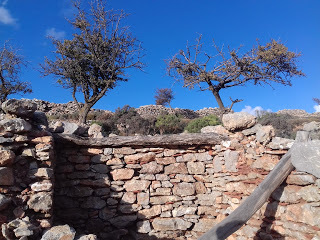

As I walked back from the red beach a couple of days ago, Ilias was outside his hotel, sweeping after the latest round of pruning of the bushes. ‘Lots of walking!’ he commented. ‘And swimming?’ I said I did – it was such a beautiful day.
‘Few people know that it’s paradise at this time of year,’ he said. Those of us who stay for the winter – it’s only a few hundred – stay because we love it. And it is a very friendly community.Ilias reminds me to keep my phone with me when I walk alone and remember the emergency number, 112. I thank him.
 I’ve been coming and going a lot with travels in October and November – to Halki and Nisyros, to Rhodes and Athens and the Meteora. To the harbour again this morning with a bigger bag this time. And with ‘many kisses’ for my parents from Delos, who treated me to an extra glass of wine with the pork gyros and Greek salad at Kyriakos Grill last night.‘Are you leaving?’ asked Panayiotis, standing on the dock. Just for a few weeks, I say. He says he’s meeting his wife off the boat… but not until tomorrow. Bit early, I think. His daughter’s living in Strasbourg and keeps inviting him but he likes to stay in Tilos and not go anywhere. ‘I tell her – I’m coming!’ Then he adds, grinning: ‘With the fishing boat….’Once I’m up on deck, I watch him and other guys hanging around the ferry as it waits for the time to leave, joking with one another. Stelios Stefanakis walks off the ramp, laughing at something, throws down his cigarette and gets on his scooter to zip back the hundred yards to his office. That’s the signal, and the ramp starts to move.As I sat writing this on the ferry to Rhodes, where I’m connecting to my flight, I felt a finger poking me on the shoulder and it was the priest from Megalo Horio, Papa Manolis, grinning at me and asking, ‘What are you writing now?’
I’ve been coming and going a lot with travels in October and November – to Halki and Nisyros, to Rhodes and Athens and the Meteora. To the harbour again this morning with a bigger bag this time. And with ‘many kisses’ for my parents from Delos, who treated me to an extra glass of wine with the pork gyros and Greek salad at Kyriakos Grill last night.‘Are you leaving?’ asked Panayiotis, standing on the dock. Just for a few weeks, I say. He says he’s meeting his wife off the boat… but not until tomorrow. Bit early, I think. His daughter’s living in Strasbourg and keeps inviting him but he likes to stay in Tilos and not go anywhere. ‘I tell her – I’m coming!’ Then he adds, grinning: ‘With the fishing boat….’Once I’m up on deck, I watch him and other guys hanging around the ferry as it waits for the time to leave, joking with one another. Stelios Stefanakis walks off the ramp, laughing at something, throws down his cigarette and gets on his scooter to zip back the hundred yards to his office. That’s the signal, and the ramp starts to move.As I sat writing this on the ferry to Rhodes, where I’m connecting to my flight, I felt a finger poking me on the shoulder and it was the priest from Megalo Horio, Papa Manolis, grinning at me and asking, ‘What are you writing now?’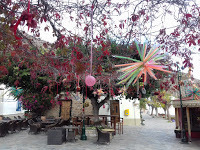

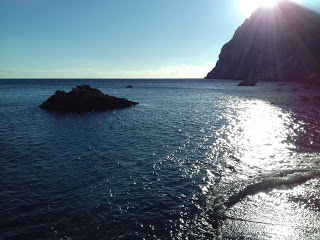
Published on December 10, 2017 05:25
October 7, 2017
Breaking the Pomegranate
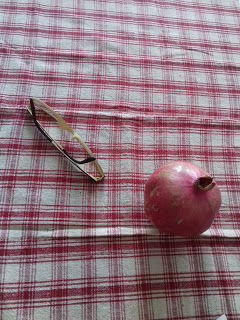
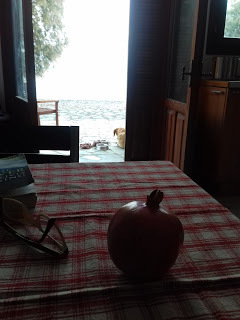
'We say spame to rodi,' said Dimos at Faros taverna yesterday evening, handing me a pomegranate to break for luck with my new home. We'd just finished a dinner of calamari and briam and fried small fish, which are just available again since the season began for fishing with trata nets. I'd learned of this good news after running into Stelios on Friday's Blue Star ferry to Rhodes. (On the way back, a couple of young guys were playing lyra and laouto on the top deck.)
I told Dimos I'd already broken and eaten a pomegranate in my new home on the seafront in Livadia. At first it felt strange living in Livadia after so many years in Megalo Horio. One of the benefits of living here is wandering down to the square mid-morning to see which of the farmers from Megalo Horio or Eristos is selling fresh produce. A couple of days ago I'd bought green guava that flooded the kitchen with their apple-pear aroma, and pomegranates, and olive oil, and fresh olives that I'm soaking in water to prepare them for eating.
On the way to dinner, walking along the seafront, I had run into people I know with their dog. They asked where I was living now and I told them. It's directly facing the sea, and they weren't the first to warn me that it could get lively there with winds and waves. 'The question is how you'll get out the door in the winter!' laughed Seva. Her husband said, 'Ah, she'll be OK, she's lived in north Karpathos!'
So here I am, with the red fruit on my hand-woven tablecloth that I bought from Anna Lentaki in Avlona a couple of days before leaving Karpathos. I have rented this place for the winter, and then we'll see. The first of the autumn rain came down on Friday night, accompanied by a power cut, and more rain came down this morning as I was waking up, and now the sun is peeking through the clouds on a silvery blue sea. The sounds are the water sweeping up to the beach, and some crows - and now, the deep rumble of the big Blue Star ferry backing into the quay. I'll work for a while, then go for a walk - there have been many beautiful walks over the last two weeks since I arrived. Oh, but first of course I'll break a pomegranate.
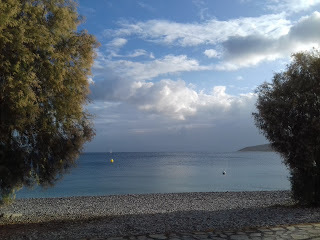
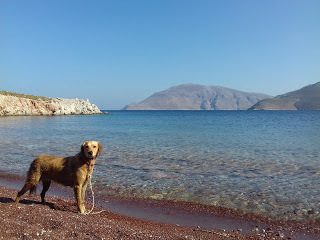
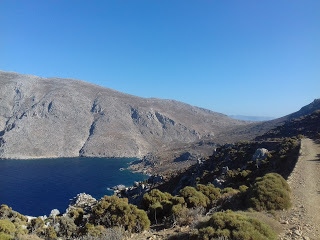
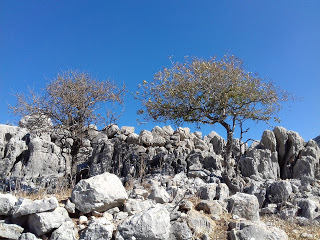
Published on October 07, 2017 22:57
September 12, 2017
A Warm Afternoon in Olympos
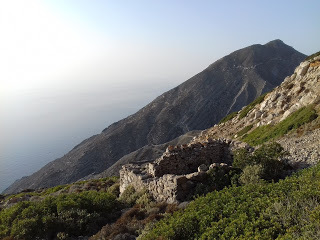
It was a warm afternoon, as Archontoula and Anezoula both said later. But I had to seize the opportunity and go. For once, I wasn't too busy or rushing back down to Agios Minas. It wasn't cloudy or windy. So I waited until after five, drank some water so I wouldn't have to carry anything, put on my walking boots and set off up Profitis Ilias.

Olympos is roughly halfway up the mountain. I walked to the edge of the village and followed the path, gradually zigzagging up the rocky slope, the day's heat bringing out the aroma of sage and thyme. Approaching the ridge, suddenly a swathe of green appeared, sweeping down to an amphitheatre of semi-circular field terraces.
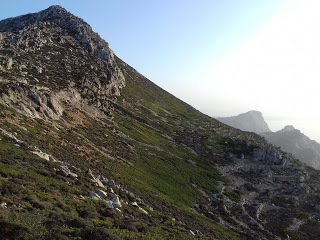

Had it been a clearer day, I'd have seen Tilos to the north. But the horizon had been hidden in a heat haze since the morning. No matter, I'll be seeing Tilos soon enough. I thought about what an amazing experience I've had since arriving in Olympos a year and a half ago. Walking here on that first day, I'd been offered a ride for the last section of the journey by kind locals. Another branch of the same family have been making life impossible at Agios Minas all summer. It got so bad that I left for a break, went back to Tilos, found myself a little house to rent for the winter. So now these are my last weeks in Olympos for some time, and I want to make the most of them.

The signage was both clear and confusing. One sign at the start of the path had said it was twenty minutes to Profitis Ilias. I must be walking very slowly, I thought as the little church on the top never seemed to get closer. I realised later that twenty minutes must mean to the point where the Olympos-Spoa intersects with the path to Profitis Ilias. I was thirsty as I pulled myself up the mountain. It was something of a relief when the sign at the top said it was an hour and a half down. Except that by then, the sun was setting...
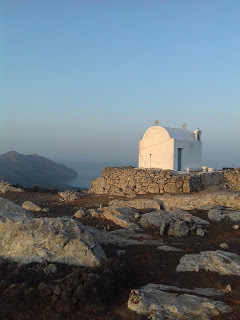

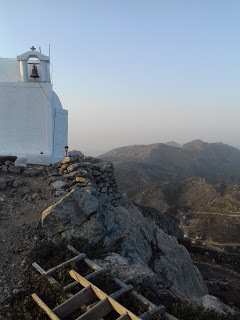
I arrived back in the village as it was getting dark. Archontoula said my face was red. I showered, then went back to Kafeneion Kriti for a beer, and a hearty dinner of meat and potatoes and bread. I spent the evening wandering from place to place seeing friends. I'm not finished with Olympos yet.
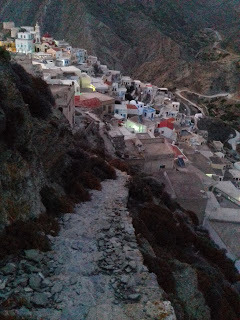
Published on September 12, 2017 00:50
June 9, 2017
A Rendezvous in Diafani
The old Russian lady was a solid and reliable member of team Anemos last year. Strong as an ox, she carried heavy loads up and down the hills of Karpathos. Her body may be a bit the worse for wear these days, but Ms Lada Niva is a fine old girl and hardly ever gave us any trouble.

Sure, something needed to be unplugged if she was going to be left alone a few days, or the battery would be drained. But when the engine refused to start one morning and M had urgent business to deal with, he got it going using a piece of machinery that usually makes a goat rotate on the spit.And sure, her interior was pretty rusted up too. The lack of a seriously effective hand-brake worried me when I had the time to think about it; and as I was driving downhill, the driver seat occasionally slid forward so far that my knees were bent up around the steering wheel, restricting access to important things like acceleration and braking. The back door is held up no longer by hydraulics but by a stick or a hand, and there has been the occasional misunderstanding leading to it falling on M’s head. Every now and then one of us has insisted we need to replace the Lada, but for sentimental and cash flow reasons, we put it off and put it off. At the start of the summer, cash is thin on the ground for taverna and studios owners like M. Then ten days ago as M and I were heading to Pigadia together to shop for supplies, there was a strange rattle which turned out to be a bearing in the gearbox giving us due warning that it was getting ready to quit. The cost of replacement according to the mechanic, four hundred euros, seemed too much to spend on something held together by rust and good fortune.
So M talked to people and hunted around online and found a very similar car for sale in Crete for an amount that was manageable with a small business loan from Barclay’s bank (i.e. me). We knew it wouldn’t be perfect, but since it was the same model as our old Lada, M could swap around some parts here or there. Ideally he would have flown the half hour to Crete to test-drive it, but flights appeared to go via Athens and cost about three times as much as a return flight to Rome, so we asked our friend Manolis in Herakleion if he could take a quick look at it. He said it seemed fine, apart from a bit of rust and a dent or two, and he could put it on the ferry he was taking to Karpathos. And so on Saturday evening, we left Lisa with a full belly and a commission to guard the nascent veggie patch from goats and hedgehogs, and took the old Lada – its gears still rattling but still going for now – to Diafani, the harbour for Olympos just a little north of here, to wait for the ferry. The Preveli, one of just two that service the island of Karpathos, is a good old-fashioned ferry. It’s been going for plenty of years; Yiannis the former headmaster in Olympos told me it arrived reconditioned when he first came from Crete to teach at the school in Olympos, and now he’s retired… And yet it has a wonderfully dreamy route from Piraeus down to Santorini and Anafi and Milos, on to Herakleion and Sitia in Crete (I took it to Sitia a couple of years ago with Lisa) and Kasos and Karpathos and Halki (a lovely connection to Tilos) and then to Rhodes. I have fantasies of spending a year just hopping on and off the Preveli…
Diafani looked pretty in the early evening light. We went first to take a look around Dorana Studios, owned by a cousin of M, another Minas. He was showing off a fine mane of black hair, some of it on his head but the rest of it liberally distributed over his bare upper body. He seemed a very friend chap and had nice rooms with a view of the sea and the church and mountains, which I figured would be good to recommend to friends and family. Then we went to get a drink on the seafront at Blue. Very soon after, summer resident Roger Jinkinson strolled by, and stopped to say hello. He was ready to partake of an ouzo next door on the little terrace of the most traditional kafeneion in Diafani. The old lady who runs it, Anna, is the only person in all north of Karpathos who sells cigarettes and tobacco when the seafront kiosk is closed, and she is very cautious about letting anyone take more than their fair share. She keeps them in a wooden cabinet in the little café, along with the chocolate. She brought Jinks his ouzo with a little bread and olives, and a figure leaned out of the door and insisted on paying for it. I apologised to Anna for sitting on her wall so I could chat with Roger, who has written a couple of books revealing the inside minutiae of local life as he’s come to know it over decades. Among other things, he told me how the old ladies of these villages have always commanded a lot of respect because they guarded valuable information about who was related to whom, and therefore who could marry whom.
Eventually I joined M again, who was sitting with a group of local men, and I enjoyed trying to follow their conversation, even if I only caught about a third of what they were talking about. At one point, a chap with a white moustache stopped in the alley and looked at M.‘I know you, don’t I? Are you from Olympos? You’re a Drakos from which part of the village/family? So we have the same great-grandfather and are second cousins! I knew it.’ He sat down with us, and I got the impression he now lived elsewhere but was back in the village. He asked, ‘So why do all the locks turn the wrong way here?’ I was pleased to hear it wasn’t just me having this problem. Olympos has its own rules.
As darkness began to fall, Vasilis arrived with a just-slaughtered goat and a box of cheese in his car; cats prowled around it. A thick-set man with a no-nonsense demeanour and occasionally twinkling eyes, Vasilis used to be a plumber and now keeps goats and makes cheese and honey underneath the church at the top of the ridge from Agios Minas. He supplies us with feta-type cheese from spring onwards for salads at the taverna, and had slaughtered the goat for Manolis and his friends who were arriving from Crete. He’d keep it in his car for now, safe from cats, as the driver window of our old Lada could only be wound up using a wrench.The Preveli should have arrived at ten past eight, but Captain Nikos said it would be sometime after nine and it showed its face sometime close to ten. We walked over to wait for the big ferry to dock. M helped someone with their bags onto the boat, then he drove off in the new/old Lada. We loaded Vasilis’ goat and a box of cheese in the back, and I had a few minutes to acquaint myself with the new old Lada before setting off up the winding road in the dark in convoy with M in the faulty old Lada and Manolis and company in his truck. All went well, until we were driving down the dirt track that winds around the hill ridges with mountain on one side and sheer drop on the other. But I’m familiar with this route now and was appointed to drive ahead. As someone who refused to drive a car, aka death machine, for twenty years, I’ve come a long way. I was pleased to see a hare bounding around in the headlights before disappearing into the bushes. Then the lights behind me disappeared too. I paused a while, hoping everything was OK, since Manolis’ truck was big and heavily loaded and he didn’t know the bends in the road. I had visions of him misjudging a turn… There again, maybe he’d just stopped to try to catch the hare. I decided it was best for me to continue and make sure I got safely home, given that we didn’t know what problems the new old Lada might have. I got back to the usual effusive welcome from Lisa, and waited for the other guys. And waited, and waited. Eventually, a phone call: Manolis’ truck had broken down. Which just goes to show that two rusty old Lada Nivas are still more reliable than anything else.
NEW: Podcast on The World Wanderers about my life in Greece:
http://www.theworldwanderers.com/travel-writing/jen-barclay/
REQUEST: If you've read An Octopus in my Ouzo and would be willing to write a few lines of review on Amazon (I promise you I don't read them!), it would be very helpful. Thanks!
P.S. Mum, I make all this stuff up, really.

Sure, something needed to be unplugged if she was going to be left alone a few days, or the battery would be drained. But when the engine refused to start one morning and M had urgent business to deal with, he got it going using a piece of machinery that usually makes a goat rotate on the spit.And sure, her interior was pretty rusted up too. The lack of a seriously effective hand-brake worried me when I had the time to think about it; and as I was driving downhill, the driver seat occasionally slid forward so far that my knees were bent up around the steering wheel, restricting access to important things like acceleration and braking. The back door is held up no longer by hydraulics but by a stick or a hand, and there has been the occasional misunderstanding leading to it falling on M’s head. Every now and then one of us has insisted we need to replace the Lada, but for sentimental and cash flow reasons, we put it off and put it off. At the start of the summer, cash is thin on the ground for taverna and studios owners like M. Then ten days ago as M and I were heading to Pigadia together to shop for supplies, there was a strange rattle which turned out to be a bearing in the gearbox giving us due warning that it was getting ready to quit. The cost of replacement according to the mechanic, four hundred euros, seemed too much to spend on something held together by rust and good fortune.

So M talked to people and hunted around online and found a very similar car for sale in Crete for an amount that was manageable with a small business loan from Barclay’s bank (i.e. me). We knew it wouldn’t be perfect, but since it was the same model as our old Lada, M could swap around some parts here or there. Ideally he would have flown the half hour to Crete to test-drive it, but flights appeared to go via Athens and cost about three times as much as a return flight to Rome, so we asked our friend Manolis in Herakleion if he could take a quick look at it. He said it seemed fine, apart from a bit of rust and a dent or two, and he could put it on the ferry he was taking to Karpathos. And so on Saturday evening, we left Lisa with a full belly and a commission to guard the nascent veggie patch from goats and hedgehogs, and took the old Lada – its gears still rattling but still going for now – to Diafani, the harbour for Olympos just a little north of here, to wait for the ferry. The Preveli, one of just two that service the island of Karpathos, is a good old-fashioned ferry. It’s been going for plenty of years; Yiannis the former headmaster in Olympos told me it arrived reconditioned when he first came from Crete to teach at the school in Olympos, and now he’s retired… And yet it has a wonderfully dreamy route from Piraeus down to Santorini and Anafi and Milos, on to Herakleion and Sitia in Crete (I took it to Sitia a couple of years ago with Lisa) and Kasos and Karpathos and Halki (a lovely connection to Tilos) and then to Rhodes. I have fantasies of spending a year just hopping on and off the Preveli…

Diafani looked pretty in the early evening light. We went first to take a look around Dorana Studios, owned by a cousin of M, another Minas. He was showing off a fine mane of black hair, some of it on his head but the rest of it liberally distributed over his bare upper body. He seemed a very friend chap and had nice rooms with a view of the sea and the church and mountains, which I figured would be good to recommend to friends and family. Then we went to get a drink on the seafront at Blue. Very soon after, summer resident Roger Jinkinson strolled by, and stopped to say hello. He was ready to partake of an ouzo next door on the little terrace of the most traditional kafeneion in Diafani. The old lady who runs it, Anna, is the only person in all north of Karpathos who sells cigarettes and tobacco when the seafront kiosk is closed, and she is very cautious about letting anyone take more than their fair share. She keeps them in a wooden cabinet in the little café, along with the chocolate. She brought Jinks his ouzo with a little bread and olives, and a figure leaned out of the door and insisted on paying for it. I apologised to Anna for sitting on her wall so I could chat with Roger, who has written a couple of books revealing the inside minutiae of local life as he’s come to know it over decades. Among other things, he told me how the old ladies of these villages have always commanded a lot of respect because they guarded valuable information about who was related to whom, and therefore who could marry whom.

Eventually I joined M again, who was sitting with a group of local men, and I enjoyed trying to follow their conversation, even if I only caught about a third of what they were talking about. At one point, a chap with a white moustache stopped in the alley and looked at M.‘I know you, don’t I? Are you from Olympos? You’re a Drakos from which part of the village/family? So we have the same great-grandfather and are second cousins! I knew it.’ He sat down with us, and I got the impression he now lived elsewhere but was back in the village. He asked, ‘So why do all the locks turn the wrong way here?’ I was pleased to hear it wasn’t just me having this problem. Olympos has its own rules.

As darkness began to fall, Vasilis arrived with a just-slaughtered goat and a box of cheese in his car; cats prowled around it. A thick-set man with a no-nonsense demeanour and occasionally twinkling eyes, Vasilis used to be a plumber and now keeps goats and makes cheese and honey underneath the church at the top of the ridge from Agios Minas. He supplies us with feta-type cheese from spring onwards for salads at the taverna, and had slaughtered the goat for Manolis and his friends who were arriving from Crete. He’d keep it in his car for now, safe from cats, as the driver window of our old Lada could only be wound up using a wrench.The Preveli should have arrived at ten past eight, but Captain Nikos said it would be sometime after nine and it showed its face sometime close to ten. We walked over to wait for the big ferry to dock. M helped someone with their bags onto the boat, then he drove off in the new/old Lada. We loaded Vasilis’ goat and a box of cheese in the back, and I had a few minutes to acquaint myself with the new old Lada before setting off up the winding road in the dark in convoy with M in the faulty old Lada and Manolis and company in his truck. All went well, until we were driving down the dirt track that winds around the hill ridges with mountain on one side and sheer drop on the other. But I’m familiar with this route now and was appointed to drive ahead. As someone who refused to drive a car, aka death machine, for twenty years, I’ve come a long way. I was pleased to see a hare bounding around in the headlights before disappearing into the bushes. Then the lights behind me disappeared too. I paused a while, hoping everything was OK, since Manolis’ truck was big and heavily loaded and he didn’t know the bends in the road. I had visions of him misjudging a turn… There again, maybe he’d just stopped to try to catch the hare. I decided it was best for me to continue and make sure I got safely home, given that we didn’t know what problems the new old Lada might have. I got back to the usual effusive welcome from Lisa, and waited for the other guys. And waited, and waited. Eventually, a phone call: Manolis’ truck had broken down. Which just goes to show that two rusty old Lada Nivas are still more reliable than anything else.
NEW: Podcast on The World Wanderers about my life in Greece:
http://www.theworldwanderers.com/travel-writing/jen-barclay/
REQUEST: If you've read An Octopus in my Ouzo and would be willing to write a few lines of review on Amazon (I promise you I don't read them!), it would be very helpful. Thanks!
P.S. Mum, I make all this stuff up, really.
Published on June 09, 2017 13:15
May 26, 2017
A walk from Ayios Minas
 You know that feeling when you don’t want the holiday to end…?
You know that feeling when you don’t want the holiday to end…?I took the month of May off from my editing and literary agency work, in order to rough out a first draft for a new manuscript which may turn into a book. I worked on it until I was sick of it and thought it was useless, and then I knew it was time for a break. I’ll give it time, letting ideas come to me as I do other things...
In the meantime, we’ve had people staying in our rooms in Olympos and others coming to the taverna at Ayios Minas beach. It’s not too busy, just like having friends over – from various parts of Europe. Lella and Pierangelo left their car at the main road and walked the few kilometres down the track to the beach in the late afternoon, and sat by the sea for a while. They came to drink some wine and decided to stay for an early dinner. They devoured their salad, saying bellissimo.
The man with the beautiful smile, Pierangelo from central Portugal, ate calamari stuffed with brown rice and spinach – Minas’ fantastic new recipe – and Lella, from Milano, ate lamb chops. Then Lella sang happy birthday to M in a voice that was astonishingly operatic.
‘Darling, let me tell you something,’ said M to Lella. ‘It’s not really my birthday. I told you it was my birthday because I wanted to buy you a drink.’
M sang a Greek song for her and they sang Beatles songs together and we laughed and danced, and finally we hugged and kissed and M drove the couple up to their car, Lella insisting she was sorry that she’d interrupted his birthday (which wasn't his birthday). I remembered what’s special about running a taverna here; when you meet people like Pierangelo and Lella, people you’d like to be friends with.

It’s been a lovely month, the sea warmer, swallows flitting around. When I walk Lisa around the valley, I come across families of perdikes (partridges), the tiny babies popping up seemingly out of the dry ground and the parent flying off and abandoning them. On the first day I started to notice them, I also saw an eagle circling – perhaps no coincidence.
 In the last few quiet days of holiday, and before the weather gets too hot, I wanted to do some walking. I meant to get up early this morning, but the wine was going down easily last night and the bed was comfortable so I woke up around 8 a.m. I put some cheese and cold sausage in the backpack, a couple of lemon biscuits I made, a couple of big bottles of water and we were off up the hill, Lisa and I.
In the last few quiet days of holiday, and before the weather gets too hot, I wanted to do some walking. I meant to get up early this morning, but the wine was going down easily last night and the bed was comfortable so I woke up around 8 a.m. I put some cheese and cold sausage in the backpack, a couple of lemon biscuits I made, a couple of big bottles of water and we were off up the hill, Lisa and I.
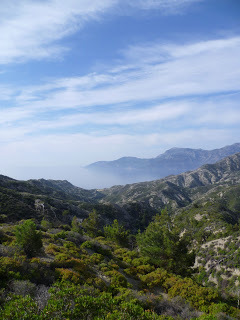
It was already warm, and still, a bit of heat haze, the sea glassy calm far in the distance towards Apella, as we passed the bee hives with one of the best views in the world. We reached the road and headed south a little until the sign that indicates the start of the footpath to Spoa. Lisa found a pool of fresh water and then some goats, and I somehow missed the start of the path up the mountain so instead we followed the track around the back of the mountain, which was magnificent.
A truck came up behind us and stopped at the little chapel of Ayia Marina (confusing as there’s another Ayia Marina a little northwest of there). We also passed markings for another footpath. I finally checked my map, and saw we were heading to the mostly abandoned settlement of Asia. When we reached the end of the road, amid old stone houses and threshing circles was the truck. An old lady in a white dress and black headscarf was waving her arms around and shouting in an effort to scare some goats out of the barn into a pen, from which they were being wrangled into the truck. The goats were being uncooperative.
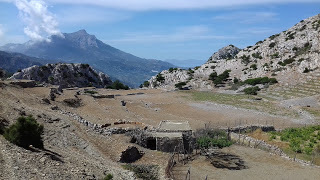

Lisa was also being uncooperative. Whenever we reached a bit of shade, she walked in that direction and simply sat down, avoiding my eyes. We had some breakfast, and I decided to leave any footpaths for another day. We stopped at every freshwater pool on the way back, then close to the top of the track heading back down to Ayios Minas, to finish the rest of the picnic. The heady aroma of the pine trees in the hot midday sun made me think of retsina.

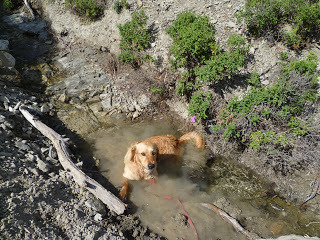
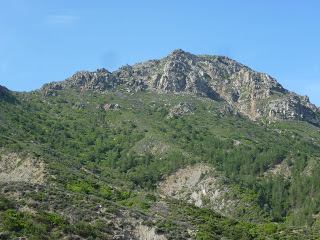
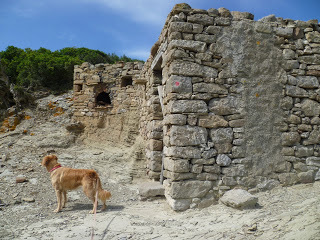
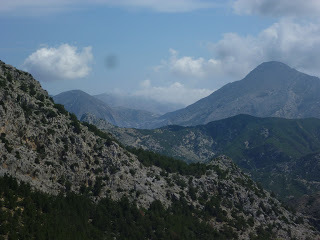


Published on May 26, 2017 10:35
April 19, 2017
Lambri Triti in Olympos, Karpathos
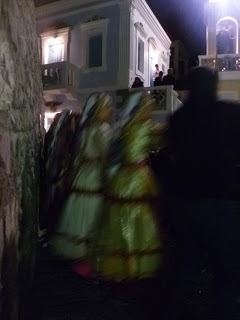
The biggest day of Easter in Olympos is Lambri Triti, Bright Tuesday. In the morning, the bells start to ring and a few men carry the large icons out of the church and around the village, stopping at different chapels with the priest before gradually making their way down to the cemetery. There, he'll bless the family graves. The women wear their best traditional dress, bright stiff skirts and puffy sleeves in an almost Elizabethan style with much sparkling trim; it's a striking scene, a big draw for photographers. Last year, when I followed the procession I felt very conscious that we small group of tourists looked like scruffy papparazzi.
 There again, as I said to Raymond from northern France yesterday evening, the locals take photographs of their cultural events just as much as the outsiders do. Raymond, carrying a fairly big camera, had been expressing similar concern about the number of photographers jostling for position. Yet all the village kafeneia have their walls covered in photos from years and decades past, a document of village life. There were mobile phones aplenty recording the musicians playing in the square, and at one point we laughed as a local young woman in full traditional dress held two mobile phones to record the proceedings – capturing footage of us in the process.
There again, as I said to Raymond from northern France yesterday evening, the locals take photographs of their cultural events just as much as the outsiders do. Raymond, carrying a fairly big camera, had been expressing similar concern about the number of photographers jostling for position. Yet all the village kafeneia have their walls covered in photos from years and decades past, a document of village life. There were mobile phones aplenty recording the musicians playing in the square, and at one point we laughed as a local young woman in full traditional dress held two mobile phones to record the proceedings – capturing footage of us in the process.Last year, it had been too cold for the music to happen in the square in the evening – it was moved to a hall at the edge of the village and happened very late – so it was a treat to experience yesterday. In the afternoon someone was playing tsambouna, the goatskin bagpipe, in the Zografidis kafeneio. A little later, tables were set up outside and a small group of men old and young sang mantinades, improvised verses, to music played on laouto and lyra. Every now and then a fresh whisky bottle appeared on the table. The mantinades, the few I could understand, tended to be about how they appreciated one another’s company and how good it was to celebrate together.





Gradually more and more people gathered around the company to listen, as the sun went down and the night wore on. A cold wind blew off the sea and the mountain but the musicians were kept warm by the crowd gathered around, and perhaps the Johnny Walker. The men on the lyra and laouto were replaced by younger men, whose fingers never left the instruments - one of the nearby men placed cigarettes and cups of whisky to their lips. A few men and then women began to dance – less of a dance than a very slow shuffle around the table. More hours passed. Finally, after midnight, came the moment we’d all been waiting for, and everyone moved up the steps to the square in front of the church, where there was more room for everyone to join in the dancing.




The men who led the dance displayed some flamboyant leaps and moves. For most of the rest of the circle clasping hands, it was the same tiny, subtle, bouncy steps for what seemed like hour upon hour, though towards the end there was a break towards something livelier. Then the party broke up around 4 a.m., and the village went to sleep.
Check out photographs from last Lambri Triti by my friend Michael Pappas:https://pculiar.com/events/easter-tuesday-lambri-triti-at-olympos-village
Published on April 19, 2017 11:12
April 17, 2017
Happy Easter
Today’s been a lazy, quiet day, after a splendid Easter Sunday here at Ayios Minas – around a year since I first came here. In the last six weeks, much has happened. In March we spent a hot, sunny day in Avlona, Lisa and I walking the footpath from Olympos while Minas and his uncle trimmed their vines, then we all drove on to a valley beyond there to see the peonies.


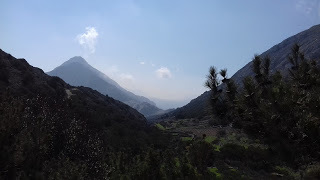
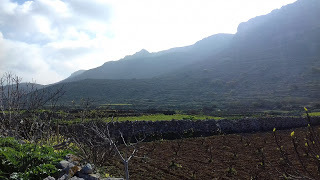
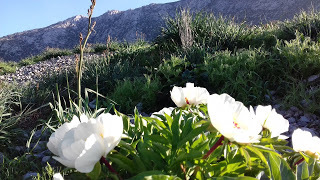

One of the first guests of the year staying at our studios in Olympos arrived at the end of March just as a huge thunderstorm came with a deluge of rain. It knocked out the power temporarily, and left roads broken and covered in rockslides. I was amazed by the noise of streams rushing down the mountains in Olympos. The riverbed turned to a gushing river, which changed the colour of the sea. Gorgeous waterfalls appeared in the valley. When the sun came out again, the air was so clear and the light intense. Thankfully, Juliette had chance that week to sit in sunshine on the terrace. Here down at Ayios Minas, the riverbed also turned into a river, the banks thick with flowers, bordered by fragrant pine trees and olive trees. Lisa loved the rock pools and I sat and listened with happiness to little temporary waterfalls. Thanks to all the rain this winter, the abundance of flowers has been breath-taking. So many flowers, different types every day in every colour in the lush green fields and deeper green hills.
Here down at Ayios Minas, the riverbed also turned into a river, the banks thick with flowers, bordered by fragrant pine trees and olive trees. Lisa loved the rock pools and I sat and listened with happiness to little temporary waterfalls. Thanks to all the rain this winter, the abundance of flowers has been breath-taking. So many flowers, different types every day in every colour in the lush green fields and deeper green hills.

In early April, we took the opportunity to visit some places in the south of the island where I’d not been yet, including Amoopi with its pretty pale sand beaches. Lately we’ve seen the occasional hoopoe, Bonelli’s eagle, peregrine or kestrel. One day, Lisa barked at something in the next field. We looked and there was what looked like a heron, but more colourful than the grey herons I'd seen before. It seemed tired and didn’t fly far. That day, I walked down to the beach for a swim, and I hadn’t got very far out when a fishing boat appeared around the headland. I thought it was probably passing but it turned into the bay, and lo and behold it was Stamatis, his first visit to us since September. He handed us a keep-net full of flapping menoula. We put some tables together and grilled the fish on the barbecue. It was another sign that summer’s almost here.
Lately we’ve seen the occasional hoopoe, Bonelli’s eagle, peregrine or kestrel. One day, Lisa barked at something in the next field. We looked and there was what looked like a heron, but more colourful than the grey herons I'd seen before. It seemed tired and didn’t fly far. That day, I walked down to the beach for a swim, and I hadn’t got very far out when a fishing boat appeared around the headland. I thought it was probably passing but it turned into the bay, and lo and behold it was Stamatis, his first visit to us since September. He handed us a keep-net full of flapping menoula. We put some tables together and grilled the fish on the barbecue. It was another sign that summer’s almost here.
 On Easter Saturday, I went up to Olympos with Minas, who was helping his uncle Nick for a few evenings at Geia Mas taverna. Immediately I arrived, I said hello to a French man and an English man sitting at a table and they invited me to drink some wine with them. They were visiting Olympos for the first time and had just met that evening in one of the other hostelries. We all got along, the evening flying by. We could hear traditional music coming from next door at Parthenon taverna, and see the people going into church, and hear the firecrackers, and when the service ended we went outside to greet friends with Christos Anesti. Over the course of the evening we’d met a young woman from Athens who came in looking for a cigarette, and when she said she and her partner were off to Kafeneio Kriti to meet some other friends, Minas and I decided to join them to give Easter greetings to Archontoula and Philippas too. We all sat down to eat together. Greeks are used to eating mayeiritsaon the night of Easter Saturday. A soup made with green vegetables and the intestines of the goat, it’s the first meat dish to break the fast of Lent, intended to prepare you for the goat feast the next day. But this was patsa, morsels of goat’s stomach cooked in an egg-and-lemon broth, and they nervously pushed bits of tripe around the plate. Something about seeing the city folk squirm – plus, to be fair, the large quantity of wine I’d drunk – made me dig in with gusto. Minas did too, and we found it pretty tasty. And so, after being up until 3 a.m. drinking wine and eating goat-stomach soup, I was feeling not quite at my best the next morning when we got up not long after 7 to start preparing for the day. But no matter. The weather couldn’t have been more beautiful: not a breeze or a cloud to bother the blue sky. I kneaded bread dough and left it to rise while Minas lit the charcoal and attached the whole goat to the spit. It had been slaughtered at the top of the valley a couple of nights earlier when he went to pick up the goat’s cheese. He’d made tzatziki and melitzanosalata, aubergine salad. We cleaned and organised, then relaxed as the meat roasted. I went to the beach for a swim, and the pebbles and sand were too hot to walk on – first time this year.Lisa announced the first guests with some loud barking. Over the winter so few people come down to Ayios Minas, it’s handy to have a Distant Early Warning Signal when a vehicle appears. But yesterday, Lisa’s vocal cords and our ears were tested. Our Swiss visitors were walking down the track, and her barks accompanied them all the way. By early afternoon, the sea was flat calm, and everyone seemed happy to enjoy the beach while waiting for the meat to be ready. After a long swim, I went for a walk up the riverbed and noticed the little yellow pom-poms of the overhanging trees had overnight been shed, leaving the ground dusted with gold, and to compensate, the yellow broom flowers were now smelling so sweet – I picked a few, and we decided to decorate the tables with them.
On Easter Saturday, I went up to Olympos with Minas, who was helping his uncle Nick for a few evenings at Geia Mas taverna. Immediately I arrived, I said hello to a French man and an English man sitting at a table and they invited me to drink some wine with them. They were visiting Olympos for the first time and had just met that evening in one of the other hostelries. We all got along, the evening flying by. We could hear traditional music coming from next door at Parthenon taverna, and see the people going into church, and hear the firecrackers, and when the service ended we went outside to greet friends with Christos Anesti. Over the course of the evening we’d met a young woman from Athens who came in looking for a cigarette, and when she said she and her partner were off to Kafeneio Kriti to meet some other friends, Minas and I decided to join them to give Easter greetings to Archontoula and Philippas too. We all sat down to eat together. Greeks are used to eating mayeiritsaon the night of Easter Saturday. A soup made with green vegetables and the intestines of the goat, it’s the first meat dish to break the fast of Lent, intended to prepare you for the goat feast the next day. But this was patsa, morsels of goat’s stomach cooked in an egg-and-lemon broth, and they nervously pushed bits of tripe around the plate. Something about seeing the city folk squirm – plus, to be fair, the large quantity of wine I’d drunk – made me dig in with gusto. Minas did too, and we found it pretty tasty. And so, after being up until 3 a.m. drinking wine and eating goat-stomach soup, I was feeling not quite at my best the next morning when we got up not long after 7 to start preparing for the day. But no matter. The weather couldn’t have been more beautiful: not a breeze or a cloud to bother the blue sky. I kneaded bread dough and left it to rise while Minas lit the charcoal and attached the whole goat to the spit. It had been slaughtered at the top of the valley a couple of nights earlier when he went to pick up the goat’s cheese. He’d made tzatziki and melitzanosalata, aubergine salad. We cleaned and organised, then relaxed as the meat roasted. I went to the beach for a swim, and the pebbles and sand were too hot to walk on – first time this year.Lisa announced the first guests with some loud barking. Over the winter so few people come down to Ayios Minas, it’s handy to have a Distant Early Warning Signal when a vehicle appears. But yesterday, Lisa’s vocal cords and our ears were tested. Our Swiss visitors were walking down the track, and her barks accompanied them all the way. By early afternoon, the sea was flat calm, and everyone seemed happy to enjoy the beach while waiting for the meat to be ready. After a long swim, I went for a walk up the riverbed and noticed the little yellow pom-poms of the overhanging trees had overnight been shed, leaving the ground dusted with gold, and to compensate, the yellow broom flowers were now smelling so sweet – I picked a few, and we decided to decorate the tables with them.
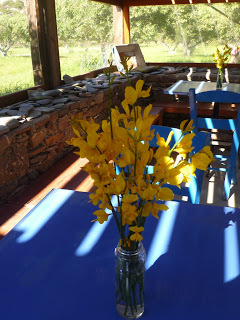
The food was ready just as the sun began to drop towards the hilltops, and everyone joined the tables together to eat.






One of the first guests of the year staying at our studios in Olympos arrived at the end of March just as a huge thunderstorm came with a deluge of rain. It knocked out the power temporarily, and left roads broken and covered in rockslides. I was amazed by the noise of streams rushing down the mountains in Olympos. The riverbed turned to a gushing river, which changed the colour of the sea. Gorgeous waterfalls appeared in the valley. When the sun came out again, the air was so clear and the light intense. Thankfully, Juliette had chance that week to sit in sunshine on the terrace.
 Here down at Ayios Minas, the riverbed also turned into a river, the banks thick with flowers, bordered by fragrant pine trees and olive trees. Lisa loved the rock pools and I sat and listened with happiness to little temporary waterfalls. Thanks to all the rain this winter, the abundance of flowers has been breath-taking. So many flowers, different types every day in every colour in the lush green fields and deeper green hills.
Here down at Ayios Minas, the riverbed also turned into a river, the banks thick with flowers, bordered by fragrant pine trees and olive trees. Lisa loved the rock pools and I sat and listened with happiness to little temporary waterfalls. Thanks to all the rain this winter, the abundance of flowers has been breath-taking. So many flowers, different types every day in every colour in the lush green fields and deeper green hills.

In early April, we took the opportunity to visit some places in the south of the island where I’d not been yet, including Amoopi with its pretty pale sand beaches.
 Lately we’ve seen the occasional hoopoe, Bonelli’s eagle, peregrine or kestrel. One day, Lisa barked at something in the next field. We looked and there was what looked like a heron, but more colourful than the grey herons I'd seen before. It seemed tired and didn’t fly far. That day, I walked down to the beach for a swim, and I hadn’t got very far out when a fishing boat appeared around the headland. I thought it was probably passing but it turned into the bay, and lo and behold it was Stamatis, his first visit to us since September. He handed us a keep-net full of flapping menoula. We put some tables together and grilled the fish on the barbecue. It was another sign that summer’s almost here.
Lately we’ve seen the occasional hoopoe, Bonelli’s eagle, peregrine or kestrel. One day, Lisa barked at something in the next field. We looked and there was what looked like a heron, but more colourful than the grey herons I'd seen before. It seemed tired and didn’t fly far. That day, I walked down to the beach for a swim, and I hadn’t got very far out when a fishing boat appeared around the headland. I thought it was probably passing but it turned into the bay, and lo and behold it was Stamatis, his first visit to us since September. He handed us a keep-net full of flapping menoula. We put some tables together and grilled the fish on the barbecue. It was another sign that summer’s almost here.
 On Easter Saturday, I went up to Olympos with Minas, who was helping his uncle Nick for a few evenings at Geia Mas taverna. Immediately I arrived, I said hello to a French man and an English man sitting at a table and they invited me to drink some wine with them. They were visiting Olympos for the first time and had just met that evening in one of the other hostelries. We all got along, the evening flying by. We could hear traditional music coming from next door at Parthenon taverna, and see the people going into church, and hear the firecrackers, and when the service ended we went outside to greet friends with Christos Anesti. Over the course of the evening we’d met a young woman from Athens who came in looking for a cigarette, and when she said she and her partner were off to Kafeneio Kriti to meet some other friends, Minas and I decided to join them to give Easter greetings to Archontoula and Philippas too. We all sat down to eat together. Greeks are used to eating mayeiritsaon the night of Easter Saturday. A soup made with green vegetables and the intestines of the goat, it’s the first meat dish to break the fast of Lent, intended to prepare you for the goat feast the next day. But this was patsa, morsels of goat’s stomach cooked in an egg-and-lemon broth, and they nervously pushed bits of tripe around the plate. Something about seeing the city folk squirm – plus, to be fair, the large quantity of wine I’d drunk – made me dig in with gusto. Minas did too, and we found it pretty tasty. And so, after being up until 3 a.m. drinking wine and eating goat-stomach soup, I was feeling not quite at my best the next morning when we got up not long after 7 to start preparing for the day. But no matter. The weather couldn’t have been more beautiful: not a breeze or a cloud to bother the blue sky. I kneaded bread dough and left it to rise while Minas lit the charcoal and attached the whole goat to the spit. It had been slaughtered at the top of the valley a couple of nights earlier when he went to pick up the goat’s cheese. He’d made tzatziki and melitzanosalata, aubergine salad. We cleaned and organised, then relaxed as the meat roasted. I went to the beach for a swim, and the pebbles and sand were too hot to walk on – first time this year.Lisa announced the first guests with some loud barking. Over the winter so few people come down to Ayios Minas, it’s handy to have a Distant Early Warning Signal when a vehicle appears. But yesterday, Lisa’s vocal cords and our ears were tested. Our Swiss visitors were walking down the track, and her barks accompanied them all the way. By early afternoon, the sea was flat calm, and everyone seemed happy to enjoy the beach while waiting for the meat to be ready. After a long swim, I went for a walk up the riverbed and noticed the little yellow pom-poms of the overhanging trees had overnight been shed, leaving the ground dusted with gold, and to compensate, the yellow broom flowers were now smelling so sweet – I picked a few, and we decided to decorate the tables with them.
On Easter Saturday, I went up to Olympos with Minas, who was helping his uncle Nick for a few evenings at Geia Mas taverna. Immediately I arrived, I said hello to a French man and an English man sitting at a table and they invited me to drink some wine with them. They were visiting Olympos for the first time and had just met that evening in one of the other hostelries. We all got along, the evening flying by. We could hear traditional music coming from next door at Parthenon taverna, and see the people going into church, and hear the firecrackers, and when the service ended we went outside to greet friends with Christos Anesti. Over the course of the evening we’d met a young woman from Athens who came in looking for a cigarette, and when she said she and her partner were off to Kafeneio Kriti to meet some other friends, Minas and I decided to join them to give Easter greetings to Archontoula and Philippas too. We all sat down to eat together. Greeks are used to eating mayeiritsaon the night of Easter Saturday. A soup made with green vegetables and the intestines of the goat, it’s the first meat dish to break the fast of Lent, intended to prepare you for the goat feast the next day. But this was patsa, morsels of goat’s stomach cooked in an egg-and-lemon broth, and they nervously pushed bits of tripe around the plate. Something about seeing the city folk squirm – plus, to be fair, the large quantity of wine I’d drunk – made me dig in with gusto. Minas did too, and we found it pretty tasty. And so, after being up until 3 a.m. drinking wine and eating goat-stomach soup, I was feeling not quite at my best the next morning when we got up not long after 7 to start preparing for the day. But no matter. The weather couldn’t have been more beautiful: not a breeze or a cloud to bother the blue sky. I kneaded bread dough and left it to rise while Minas lit the charcoal and attached the whole goat to the spit. It had been slaughtered at the top of the valley a couple of nights earlier when he went to pick up the goat’s cheese. He’d made tzatziki and melitzanosalata, aubergine salad. We cleaned and organised, then relaxed as the meat roasted. I went to the beach for a swim, and the pebbles and sand were too hot to walk on – first time this year.Lisa announced the first guests with some loud barking. Over the winter so few people come down to Ayios Minas, it’s handy to have a Distant Early Warning Signal when a vehicle appears. But yesterday, Lisa’s vocal cords and our ears were tested. Our Swiss visitors were walking down the track, and her barks accompanied them all the way. By early afternoon, the sea was flat calm, and everyone seemed happy to enjoy the beach while waiting for the meat to be ready. After a long swim, I went for a walk up the riverbed and noticed the little yellow pom-poms of the overhanging trees had overnight been shed, leaving the ground dusted with gold, and to compensate, the yellow broom flowers were now smelling so sweet – I picked a few, and we decided to decorate the tables with them.

The food was ready just as the sun began to drop towards the hilltops, and everyone joined the tables together to eat.
Published on April 17, 2017 13:09
March 3, 2017
Life on a Greek island (or two)
 I’m sitting in my sunny corner of the taverna at Ayios Minas, listening to the birds. We stayed up late last night, dancing to music in our empty valley. February brought some fierce, cold winds to these islands. One day, I set off boldly up the dirt track and was almost blown over as I turned the first corner, so I headed home again. But a week later it was calm and warm, and my work deadlines were easing up, and I decided to walk the loop: taking the first track a few kilometres uphill to the road, a little way along the road that follows the ridge, and then descending the second track a few kilometres back down to the valley. ‘I’ll come with you,’ said M.I nearly fell over, and it wasn’t the wind this time. I explained where I was planning to walk and that it would take an hour or two. ‘Let’s take a bottle of water, then,’ he said.M has been seriously bonding with Lisa. He looked after her for the weeks I was away in England over December and January. He’s trained her: if you say ‘Heri,’ she gives you her paw, and presents her other paw with ‘Allo heri.’ But I didn’t think M really did walking. I thought that was my department. Who knew?When we reached the top, his cousin and aunt were in the pick-up truck on the roadside, looking for stray goats. M’s friend Pavlos would be at their place in Argoni on the other side of the ridge next day, where they keep goats and make cheese. We arranged to all meet there with his other cousin and uncle. And so the next day we went for another walk through the river bed with cousins Evgenia and Georgia, two of my best friends in Olympos.
I’m sitting in my sunny corner of the taverna at Ayios Minas, listening to the birds. We stayed up late last night, dancing to music in our empty valley. February brought some fierce, cold winds to these islands. One day, I set off boldly up the dirt track and was almost blown over as I turned the first corner, so I headed home again. But a week later it was calm and warm, and my work deadlines were easing up, and I decided to walk the loop: taking the first track a few kilometres uphill to the road, a little way along the road that follows the ridge, and then descending the second track a few kilometres back down to the valley. ‘I’ll come with you,’ said M.I nearly fell over, and it wasn’t the wind this time. I explained where I was planning to walk and that it would take an hour or two. ‘Let’s take a bottle of water, then,’ he said.M has been seriously bonding with Lisa. He looked after her for the weeks I was away in England over December and January. He’s trained her: if you say ‘Heri,’ she gives you her paw, and presents her other paw with ‘Allo heri.’ But I didn’t think M really did walking. I thought that was my department. Who knew?When we reached the top, his cousin and aunt were in the pick-up truck on the roadside, looking for stray goats. M’s friend Pavlos would be at their place in Argoni on the other side of the ridge next day, where they keep goats and make cheese. We arranged to all meet there with his other cousin and uncle. And so the next day we went for another walk through the river bed with cousins Evgenia and Georgia, two of my best friends in Olympos.
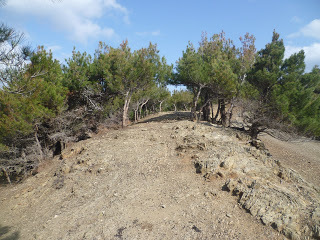

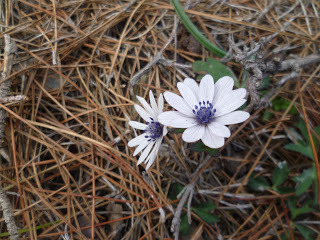

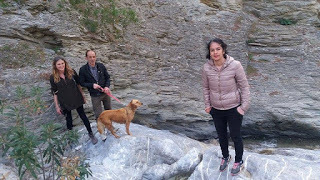

We didn’t have time to walk all the way to the sea – that would be next time. Instead, we returned to the house for a big lunch cooked by aunt Sophia, then we went outside to play with dogs and watch the sun setting.


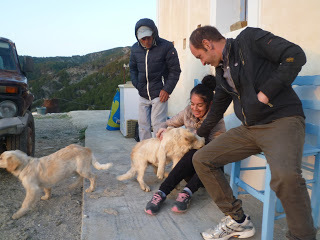

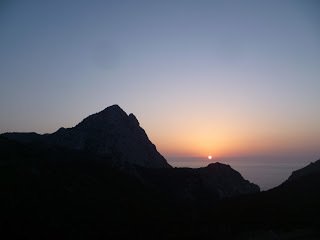

A few days later, I was leaving Karpathos on the Preveli…
 waking up in Halki… on a morning that was so warm I had to wear my shorts, and you could practically hear the locals whispering, 'A tourist!'...
waking up in Halki… on a morning that was so warm I had to wear my shorts, and you could practically hear the locals whispering, 'A tourist!'...

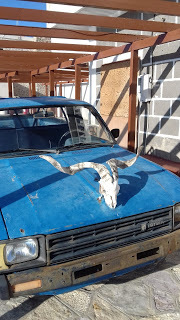
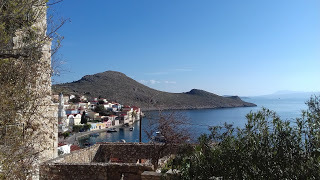
… to catch the Dodecanese Express to Tilos.When I came to Karpathos last year, I kept on renting the house with the lemon tree in Megalo Horio, and invited other visitors to stay there to cover my costs. But it was a lot of work, and a big expense over the winter, and it no longer seemed necessary to keep it on. So on Thursday and Friday I started packing up my things to send them to Karpathos, and cleaning the house to give it back to Antoni.On Saturday morning, I called Yorgos, the man with the truck who ferried my boxes on the last stage of their journey from England to Tilos back in 2011. He asked how much stuff I was sending and if it would be leaving on the boat the next morning.‘Avrio?!’ Of course, the Blue Star was the next morning, and Yorgos would need to put everything on his truck that evening. I had a mad, sweaty scramble to finish packing up. Ed and Eleftheria kindly supplied extra boxes. I had about twelve boxes, five chairs, two bookshelves, a big wooden table.Costas from Crete, who owns the house next door and visits for only a few weeks a year, just happened to be around. He asked if I wanted help. I looked at him. ‘What?’ he asked.‘Well,’ I said, ‘I’m not going to say no…’So when Yorgos arrived, Costas brought his carotsa, his wheelbarrow, and my other neighbour Andreas came too, and the guys all ferried my stuff down the narrow alley to the big truck. Phew. I tried to give Costa something to buy a drink that evening, but he refused. ‘But you helped me so much,’ I said.‘Eimaste anthropi,’ he said. We are people.
 I ran into so many people, friends, over the next couple of days as I went to a few favourite places in between bouts of cleaning the house and giving things away. It was difficult. Tilos has meant a lot to me since I moved there in April 2011. But keeping on the house was cluttering my life in a way I didn't need, and life has changed in a good way since I came to Karpathos last April, and it’s time to embrace the next chapter. My neighbour Michaelia was sad at first that I was letting the house go, but she understood when I explained and said, in her slightly scolding way, it would be good for me to settle down. Antonis said more pragmatically, ‘I know you’re an eleftheros anthropos,’ a free person, ‘and anytime you want to come back…’ Irini asked, more pragmatically still, for my pots of parsley. I had no time to see the apokries celebrations but there was fresh fish to eat, mayatiko, on two evenings; and even Eleftheria came out for a drink one night at Kali Kardia. On the Tuesday, in a free moment, I went inside the very old chapel overlooked by the house, which Michaelia keeps so beautifully, to see the frescoes.I love that ramshackle old house, perhaps a bit more without all my junk in it. I sat there alone one night, thinking how wonderfully peaceful it was. Was it always that peaceful? Suddenly I remembered why I’d wanted to leave the house even before I came to Karpathos. I’d left Lisa with M this time – but if she’d been with me, she’d have been barking at every neighbour’s footfall and every passing cat. And Menelaos, if he’d been walking by clearing his throat, would have cursed at her as always… And I’d have been shouting at her and running up the steps to bring her inside.
I ran into so many people, friends, over the next couple of days as I went to a few favourite places in between bouts of cleaning the house and giving things away. It was difficult. Tilos has meant a lot to me since I moved there in April 2011. But keeping on the house was cluttering my life in a way I didn't need, and life has changed in a good way since I came to Karpathos last April, and it’s time to embrace the next chapter. My neighbour Michaelia was sad at first that I was letting the house go, but she understood when I explained and said, in her slightly scolding way, it would be good for me to settle down. Antonis said more pragmatically, ‘I know you’re an eleftheros anthropos,’ a free person, ‘and anytime you want to come back…’ Irini asked, more pragmatically still, for my pots of parsley. I had no time to see the apokries celebrations but there was fresh fish to eat, mayatiko, on two evenings; and even Eleftheria came out for a drink one night at Kali Kardia. On the Tuesday, in a free moment, I went inside the very old chapel overlooked by the house, which Michaelia keeps so beautifully, to see the frescoes.I love that ramshackle old house, perhaps a bit more without all my junk in it. I sat there alone one night, thinking how wonderfully peaceful it was. Was it always that peaceful? Suddenly I remembered why I’d wanted to leave the house even before I came to Karpathos. I’d left Lisa with M this time – but if she’d been with me, she’d have been barking at every neighbour’s footfall and every passing cat. And Menelaos, if he’d been walking by clearing his throat, would have cursed at her as always… And I’d have been shouting at her and running up the steps to bring her inside.
 Antonis and Ed both came to help me with the four bags and a box (king-sized duvet, clothes, stereo, kitchenware, books, paperwork…) I still had left over to take on the ferry. As Ed drove me down to the port, he must have rolled his eyes listening to me againsaying, ‘What am I thinking, leaving Tilos?!’ We pulled up outside Remezzo, the bar on the port, to wait for the boat.‘Vodka tonic,’ said Ed, and it seemed a good idea. I heard my name inside at the bar and as I went in, I saw a few usual suspects including lovely Pavlos the bus driver. We’d exchanged hellos over the last few days in Megalo Horio, but I guessed that maybe he’d forgotten my name, seeing me without Lisa, and he’d just said, ‘Yeia sou…’ This time, he remembered, and shouted out his habitual greeting for me:‘Yeia sou Jennifer Lopez!’
Antonis and Ed both came to help me with the four bags and a box (king-sized duvet, clothes, stereo, kitchenware, books, paperwork…) I still had left over to take on the ferry. As Ed drove me down to the port, he must have rolled his eyes listening to me againsaying, ‘What am I thinking, leaving Tilos?!’ We pulled up outside Remezzo, the bar on the port, to wait for the boat.‘Vodka tonic,’ said Ed, and it seemed a good idea. I heard my name inside at the bar and as I went in, I saw a few usual suspects including lovely Pavlos the bus driver. We’d exchanged hellos over the last few days in Megalo Horio, but I guessed that maybe he’d forgotten my name, seeing me without Lisa, and he’d just said, ‘Yeia sou…’ This time, he remembered, and shouted out his habitual greeting for me:‘Yeia sou Jennifer Lopez!’
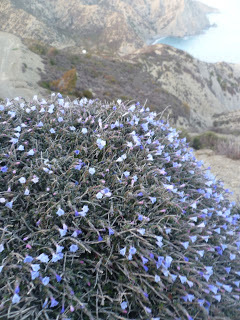

Published on March 03, 2017 02:49



